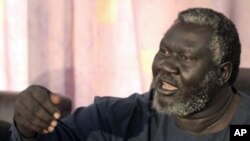While much attention has been focused on the recent referendum for south Sudan's independence, the country's 2005 peace deal, the Comprehensive Peace Agreement, also called for popular consultations to review the pact in two volatile northern states, Blue Nile and Southern Kordofan.
The so-called popular consultation is underway in Blue Nile, but not in Southern Kordofan, where last year's state-level elections could not be held amid ongoing delays to prepare the vote and concerns over security.
Jason Gluck, from the United States Institute of Peace, explains how the newly-elected authorities are helping organize the process in Blue Nile, where the popular consultation is making steady progress.
"The elected state assembly has formed a commission, and the commission in consultation with other groups is conducting the consultations," said Gluck. "It is going out to every locality in the state and is providing public forums where people are able to express their views."
Gluck explains it will be a long process of many weeks with general forums first and then specific forums after.
"Each of the key issues, for example power sharing, wealth sharing and natural resources, discrimination and equality rights, land, security, these would each receive their own hearing or series of hearings, the idea being, it is not enough to identify the problems but serious thought and consideration, and discussion needs to go in to how the states might address and treat these problems in order to come up with a proposal to take to the national government," he said.
Voting is also taking place with different propositions being offered, including one for autonomous rule.
Gluck calls the process a necessary "north-north" dialogue that needs to take place as Sudan transitions into a new post-peace-agreement era.
"Regardless of the outcome of the referendum, there is still going to be a north of Sudan," added Gluck. "And it is still going to be a country that is mired in numerous conflicts that are at once separate and yet united in the issues that underlie them and by that I mean the critical issues in Southern Kordofan, in Blue Nile, in Darfur and in other states as well really boil down to power sharing, wealth sharing, a greater degree of genuine autonomy for the states themselves. That is the key in my opinion to a lasting, peaceful, stable, north Sudan."
David Abramowitz from the U.S-based human-rights group Humanity United says what complicates matters is that fighters who fought for the south during the two-decade civil war remain in the north, including those from the Sudan People's Liberation Movement, the SPLM.
"Both Southern Kordofan and Blue Nile have substantial SPLM presence there, parts of the forces that are on the other side of the border there are very sympathetic or were part of the effort during the civil war," said Abramowitz.
The SPLM's Malik Aggar won the post of governor in last year's elections in Blue Nile, but the former rebels do not have the majority of seats in the state legislative assembly.
The governor of Southern Kordofan is Ahmed Haroun, who has been charged by the International Criminal Court for alleged war crimes and crimes against humanity in Darfur. He denies the charges. Reports indicate there has been a buildup of weapons by his government and the local SPLM.
Another tense area is Abyei where a referendum was due this month, but had to be put off. Abramowitz said the disagreements there over whether pro-Khartoum nomads should be allowed to vote, are similar to potential problems in how the popular consultations will come about.
"The questions and issues that we have seen in Abyei recently regarding the need of the pastoralist tribes to move through those areas are a microcosm of what exists along the entire border," said Abramowitz. "That is a critical issue and I think one that needs to be very closely looked at."
Analysts say the expected separation of the south will create new political uncertainty and potential violence in areas with many residents who may feel they would also like to join the new southern country, including in Southern and North Kordofan, White Nile and South Darfur. They say the debate begins with the popular consultation underway in Blue Nile.




